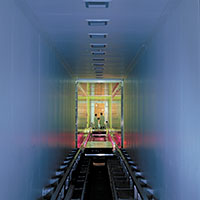Introduction
Medical device manufacturers are constantly developing new products or improving the design, packaging and/or load configurations of their current products.
Adoption of a new product into a device family or changes to an existing load configuration requires an impact assessment to the currently-validated sterilization process. The intent of this TechTip is to provide guidance for product adoption evaluation per ISO 11135:2014 and AAMI TIR28:2016.
How do we establish an EO sterilization process of a product family?
Products can be grouped into families based on their configuration, materials, density, packaging, components, design and/or challenge to the sterilization process. The different part numbers within a product family may vary in size and/or length. To validate the product family in a EO sterilization process, the family should be represented by the worst-case product or by a process challenge device (PCD) that demonstrates an equivalent or higher challenge to the sterilization process.
What are the key areas to assess for EO product adoption?
The differences between the candidate product and the currently-validated product should be identified. Important areas to assess are the impact of the product design, materials, sterile barrier and load configuration. Guidance for evaluation can be found in Annex A of TIR28:2016. If the results of the evaluation are inconclusive or determine that further evaluation is necessary, then additional studies like comparative resistance, residual analysis and temperature/humidity profiles may be required.
TechTeam Discussion:
Why would I add new products to a currently-validated process?
It is desirable to adopt new products or changes to existing products into a currently-validated process to avoid the need to qualify a new sterilization cycle.
When a new product or a change in a currently-validated product is being developed, the manufacturer should identify the differences between the candidate product and the currently validated product and the impact to the validated process.
If the product manufacturer is unsure about the impact of the inclusion of the new product or the change in the currently validated product, it is recommended to execute additional studies to analyze the effect on the sterilization process.
The following studies may be considered if the evaluation results are inconclusive:
- Comparative Resistance Study: The study includes at least one fractional cycle that compares samples of the candidate product to the existing product and internal process challenge device (IPCD). It is recommended to run this fractional cycle at the same parameters validated in the original qualification.
- EO Residuals Testing: If the evaluation indicates that there may be a residue concern, at least one full cycle should be executed to confirm the residue results. The full cycles shall be run with the same parameters utilized in the original qualification.
- Temperature and Humidity Distribution: This study is required if the technical review demonstrates that the candidate product can affect the thermodynamic response of the load in the sterilization process. The sensors should be distributed throughout the load in accordance with the original qualification.
If the above studies demonstrate that the candidate product represents a greater challenge to the sterilization process, a full performance qualification shall be performed.
References
- ISO 11135:2014, “Sterilization of health-care products – Ethylene Oxide – Requirements for the development, validation and routine control of a sterilization process for medical devices”
- AAMI TIR28:2016, “Product adoption and process equivalence for ethylene oxide sterilization”
Related TechTips
Ethylene Oxide Master File Pilot Program FAQ
Q: What is the Ethylene Oxide (EO) Sterilization Master File Pilot Program? A: In an effort to advance innovation in medical device sterilization with ethylene oxide (EO) and reduce the threat of shortages of EO-sterilized medical devices by providing
Study on the Impact of EO Concentration on Product Residuals
A study was carried out to compare the impact, if any, of EO concentration on product EO residual levels determined in accordance with ISO10993-7.
Sustainable EO® Frequently Asked Questions
As part of our commitment to providing innovative and sustainable solutions, STERIS AST has developed the Sustainable EO® sterilization services program.
Overview Of Sterilization Technology Comparison
Learn more about our global offering, which includes electron beam, gamma, X-ray, and ethylene oxide technologies

